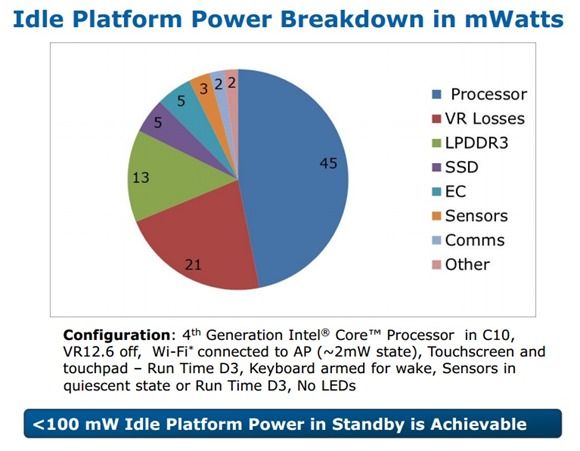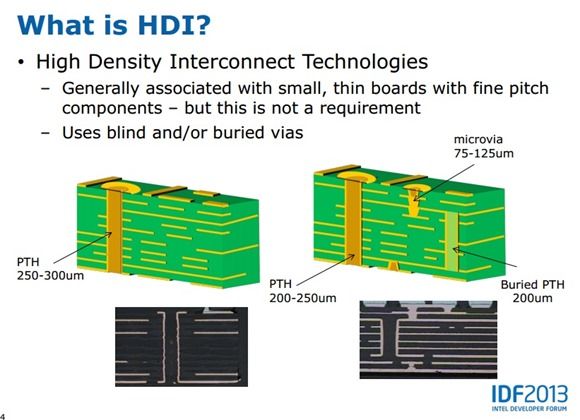In a presentation due to go out at the Intel Developer Forum over the next two days Intel will outline best practices for low-power idle on Ultrabooks. Today you’ll be lucky to see an Ultrabook idle to less than 3000mW (3 Watts) which is a background drain that’s always there. On Haswell, Intel says that you could get to a screen-off idle state of 100mW.
By effectively removing nearly 3W of background drain, all operations are going to benefit, not just idle. Where Internet browsing was a 9W operation, expect to see that go down to around 6W for a big increase in battery life.
The 100mW target requires both system designers and software engineers to build to the best standards but when it comes to laptops, it’s the Ultrabooks that have the best chance of getting the best engineers working on them. Low-power DDR3 memory, SSD storage, high-quality power components and tight board design mean the best systems won’t be cheap systems but all the ingredients and skills are now available to make laptops that idle like tablets.
Intel also want’s to see engineers using configurable TDP and other features to create systems in the 10W (fanless) range. High Density Interconnects on motherboards could also bring advantages. By reducing the mainboard size, space is created for more battery. Intel says there’s a chance to fit 20-45% more battery inside when motherboard sizes are reduced using HDI techniques.
While the ingredients and techniques might be on the shelf, it’s up to the OEMS to decide how they use them. Pricing pressures often lead to compromises so don’t expect all of the new engineering techniques to appear on anything but the high-end Ultrabooks.
The Intel Developer Forum starts today (9th April) in Beijing and runs for 2 days. Stay tuned for more Ultrabook news coming out of China.













There are going to be fanless Haswell notebooks? That’s great. I wonder if there will be even 10″ screened ones too. I was thinking about getting a Clover Trail device but if I can get a 10″ screen and Haswell then I’m all for it.
I would definitely replace my 10″ Atom consumption device for a 10″ Haswell one. It’d probably require all the recommendations Intel is promoting though. So it’ll be very expensive but I (I’m probably the only one) would pay it.
I sometimes run CPU intensive tasks like MATLAB scripts, custom software I wrote and file compression. Some of these would benefit from a SATA based SSD as well. The Atom and eMMC memory definitely struggle with these. These are all for non-work related things. I also use Handbrake but I’m not sure if the Intel Media SDK version of it will support Clover Trail.
I could see all of this translating into mobile PCs having runtimes of 9+ hours. That would be fantastic and could rejuvenate PC sales to businesses & consumers alike .. if efficiency was part of the advertising / promotion. Not sure you mentioned it before but the current rumor mill has Haswell based PCs hitting the market as soon as June.
NICE!
Love to see these power efficiency articles!
I’d love to see a similar pie chart as above detailing the PRICE of ultrabook components that make up a typical ultrabook. (And profit margins typical for each major component, too.)
Intel is going to kill the PC market if they don’t dramatically drop that profit margin on high mobility parts and in a hurry.
They need to both drop the profit margin on the Core series AND drop the restrictions on Intel Atom-based machines.
Let’s take a look at the volume of PC sales by price, then let’s compare that to Ultrabooks by price, and the compare that to the market share that ARM-based tablets are eating into. -These three diagrams side-by-side explain everything that matters right now.
The intersection of Cost, Ultra high mobility (battery life and thin and light devices) and touch-driven UI are the only things that matter. (Notice that Performance isn’t on that list?)
Intel continues to try and tell a story that their plans are helping them to compete with tablets but the numbers show it’s not happening and that they have no plans to make it happen. They are constantly neglecting price and by a long shot.
PRICE is what’s important for them to win VOLUME.
Intel is not taking advantage of their strongest competitive asset (x86 compatibility) to compete with ARM because they’re simply not providing high enough mobility value.
Adam
Is low price neccesary to achieve profit? What’s more desirable? Market share or profit per unit?
In a nutshell Intel isn’t winning because they’re not even showing up for the fight. They seem to be trying to win a fight against the Macbook Air still….
Focusing on a market niche while avoiding the majority of the market growth is just moronic. (And I’m not saying that they’re doing it because they’re dumb; they’re doing it because they’re scared of how the stock market would respond to declining profit margins.) -They need to do the right thing even if its against the wishes of the market (much like Starbucks did years back).
Adam
This won’t rejuvinate the PC business; I couldn’t disagree with that more, it should help a little bit.
What would rejuvinate the PC business is a highly mobile x86 device that falls within the mass adoption sweet spot of $400 – $600.
This helps PCs to compete with tablets on battery life but it does nothing to help with cost.
Adam